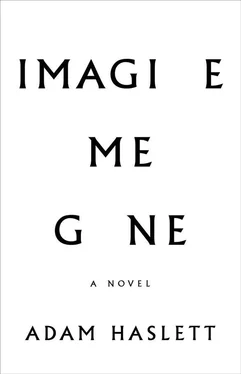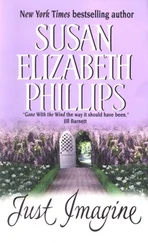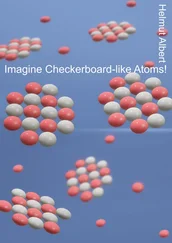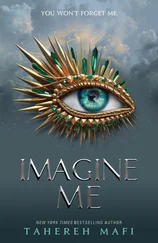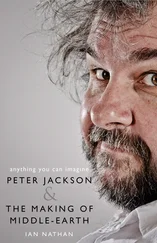Once I had settled Wendell in the car, the four of us headed into the museum that stood in the middle of the park. I’d never liked museums on Sundays. They had a depressive air. Reminders of stultifying childhood outings, being told to keep quiet and stare at boring, supposedly important things. The strange loneliness of being together with your family. I had been saintlike in my patience compared to my brothers, who had quipped and mewled through those compulsory exercises like circus acts. At least as an adult, I’d shed the guilt I used to feel for not giving each and every work its earnest two-minute inspection, and allowed myself to roam freely.
I’d been through the collection before, and let Paul guide Laura and Kyle while I wandered into a visiting exhibition of an eighteenth-century German artist I’d never heard of. It began with a room of flouncy biblical scenes. Hovering cherubs and flowing gowns, a milk-white Christ at the tomb, surrounded by grieving women, God floating in the sky above the Annunciation. None drew me in. When my phone started bleating, a well-heeled older lady, the only other patron in the gallery, glanced at me in disgust before returning her attention to a friar bent in prayer.
Back in Massachusetts it was three o’clock. Sunday afternoon was not one of the many times that Michael usually tried me. I could do what, until the last seven or eight months, I’d always done. Interrupt anything I happened to be up to and respond to the latest emergency. Behaving otherwise still felt cruel. But in the spring I had flown back to see him in the hospital, canceling appointments with patients who needed their time with me, and whose fees I needed. I’d stayed two extra days to spell my mother’s daily visits, and returned with a cold that lasted for weeks. After that trip, the way I had always been toward Michael gave out like an exhausted muscle.
I told my own therapist. I told Paul and Alec and even my mother. I said I couldn’t do it anymore: talk to him two or three times a week for half an hour, about him and only him, a patient in all but name, listening to the deadening repetitions. Even if I understood, as he kept telling me, that being able to describe his state in the moment kept his panic at bay better than any drug.
I didn’t stop responding to his calls. I just started waiting a few days before returning them. I held a bit of myself back. Knowing well enough that he was at the lowest point in his life. But that was part of it. The extremity of his situation. Where did it end? What level of need couldn’t he surpass? However much his fate had weighed on me in the past, I’d never stopped to imagine that it wasn’t my responsibility. I encouraged my own patients to see the limits of their obligation to members of their own families, but not myself. I knew full well, too, that talking to him once a week or every ten days left a greater burden on my mother. Alec, who had stepped back as I had, and at around the same time, speaking to Michael less often, understood it as well. We’d made a great effort to give him the chance of graduate school. But it had only led him back to us, worse than before. No one’s capacity was infinite. I said that every week in my office. Now I believed it.
The next gallery was full of paintings on classical themes: robed gods in laurels arrayed in a tableau on Mount Parnassus; a nearly nude Perseus leading a horse; a scene of the School of Athens, with the brightly clad philosophers leaning over their books and tablets. I gazed blankly awhile at the last of these, attracted at least to the vivid colors. The show was hardly popular, even on a Sunday, and I could see why, given the stilted subjects and antique style. But it was enough for me, just then, that it didn’t require anything of me.
Portraits of princes and aristocrats hung in the final, smaller room. Men in bright silks and brocade with ruffled collars and pendants adorning their breasts. Complimentary pictures for the men who’d commissioned them.
I took a seat on the bench to rest before heading back to rejoin the others.
The portrait in front of me had a different aspect from the rest: a man in his early fifties, simply dressed in a russet coat with a plain black collar and brown neckerchief. His wavy black hair hung down to his shoulders, with no wig or jeweled clasp to hold it in place. There were no tapestries or upholstered furniture in the background, just a featureless gray-brown, which focused all the viewer’s attention on the face itself. It seemed to be by a different artist altogether. Not because of its darker palette and lack of finery, and not because it possessed any greater degree of realism. It was something more ineffable. I had the sense that this person had been alive. Not merely historically, like the other personages here, but alive in the way of experience. He’d been present to things which had marked him, and which were registered in the image. Despondency, I might have said, given the dark cast of the eyes and the unsmiling lips, but that didn’t suffice. It hadn’t been that simple. Haunted, I thought, but that wasn’t right either. Occupied was more like it, inhabited by a thought not his own, a force not of his choosing, something he had endured over the course of years. When I stood for a closer look, I saw the label SELF-PORTRAIT.
The light in the picture fell on his wide forehead and across his nose, casting the right side of his face in partial shadow. His eyebrows were just fractionally lifted, not in surprise but in a kind of openness. As if the tension of anticipation had passed out of him. He was not an old man, yet no longer young. The eyes themselves were large, and black, and dead calm. They peered into me and into the past, to whatever it was that had brought him to such an unsentimental understanding of himself. An undeluded apprehension of things as they were. He was neither afraid nor heroic.
The longer I gazed, the more familiar he seemed: the brow, the full lips, the double chin. I saw it most in the expression itself, in that particular stamp of an inescapable fate. Some essence of my father was embedded in the painting, beholding me and seemingly on the verge of speech, the words already formed in the figure’s slightly open mouth. I was listening as much as looking now. The utterance wasn’t coming from any motion of the image, filmlike, but directly from him into me. He and I were together again, the facts, at last, irrelevant: that we hadn’t saved him, that he hadn’t saved us. He knew that it hadn’t ended, that he still lived in Michael. I could say nothing in return. His presence was all there was.
We drove down through the Presidio to the marina, and found a restaurant with seating outdoors, and Kyle ordered us a pitcher of margaritas. I drank one before the food arrived, and another with my meal. Across the table, Kyle draped his arm over Laura’s shoulders, and she rested her head against him, gazing through her sunglasses at the water. Apparently taken by the mood — the sun and the drink — Paul shifted his chair closer to mine and did the same, as coupley as he ever got in public. I drifted awhile in the comfort of the four of us there together, unoccupied.
Afterward we ambled across the road to the trail that ran along the back of the beach. This time when my phone rang it was Alec. I told the rest of them to go ahead with Wendell.
“Hey,” he said, tight-voiced, yanking me in close right away. He told me how Mom had called him that morning in a state, how she’d been up in the middle of the night with Michael, how he’d wanted to call an ambulance, and how she’d had to talk him down. “And you know what else?” he said. “She’s had a real estate agent in there. She’s trying to sell the house. She says she doesn’t know what else to do.”
Читать дальше
